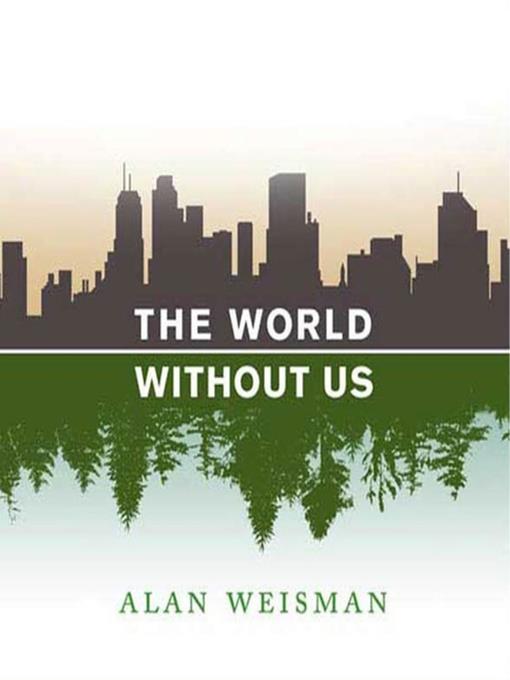
The World Without Us
کتاب های مرتبط
- اطلاعات
- نقد و بررسی
- دیدگاه کاربران
نقد و بررسی

It's almost disturbing that this book is so interesting. Weisman examines what the Earth would be like if there were no more humans. Assuming some sort of apocalypse that wipes us from the menu of mammals, he takes the long view, describing how our remnants would crumble and fade away over time--in some cases a very long time. Narrator Adam Grupper enhances this fascinating perspective through his impeccable reading, which is both sincere and balanced. Never veering into sensationalism, always objective and phlegmatic, Grupper takes what could be a depressing topic and makes it a book you just can't stop listening to. This combination of science, history, and futurology teaches us much about who we are and what we will leave behind. K.M. Winner of AudioFile Earphones Award (c) AudioFile 2007, Portland, Maine

Starred review from May 14, 2007
I
f a virulent virus—or even the Rapture—depopulated Earth overnight, how long before all trace of humankind vanished? That's the provocative, and occasionally puckish, question posed by Weisman (An Echo in My Blood
) in this imaginative hybrid of solid science reporting and morbid speculation. Days after our disappearance, pumps keeping Manhattan's subways dry would fail, tunnels would flood, soil under streets would sluice away and the foundations of towering skyscrapers built to last for centuries would start to crumble. At the other end of the chronological spectrum, anything made of bronze might survive in recognizable form for millions of years—along with one billion pounds of degraded but almost indestructible plastics manufactured since the mid-20th century. Meanwhile, land freed from mankind's environmentally poisonous footprint would quickly reconstitute itself, as in Chernobyl, where animal life has returned after 1986's deadly radiation leak, and in the demilitarized zone between North and South Korea, a refuge since 1953 for the almost-extinct goral mountain goat and Amur leopard. From a patch of primeval forest in Poland to monumental underground villages in Turkey, Weisman's enthralling tour of the world of tomorrow explores what little will remain of ancient times while anticipating, often poetically, what a planet without us would be like.

August 27, 2007
Because of the scientific terminology and the interlinked data amassed bit by bit, this is not an easy read for narrator or lay listener. But it's a fascinating book, and Grupper handles it well. Grupper's careful narration brings to life Weisman's judicious organization, unambiguous grammatical structure and vivid descriptions of what would become of land, sea, fish, flora and fauna should humans disappear from the face of the earth. Weisman explains the earth's capacity for self-healing. Unchecked by human intervention, a city like New York would flood within days, its buildings and infrastructure would collapse, and soon the city would revert to its original ecosystem. But the message of the book is our legacy to the universe: “Every bit of plastic manufactured over the last 80 years or so still remains somewhere in the environment.” Weisman and Grupper convert abstract environmental concepts into concrete ideas. Broadly and meticulously researched, finely interwoven journalism and imaginative projection, the book is an utterly convincing call to action. Simultaneous release with the St. Martin's/Dunne hardcover (Reviews, May 14).

September 15, 2007
It is now generally accepted that human activities are causing global warming and that this warming is causing planetwide ecological damage. But what would happen if the human race vanished? Weisman explores this interesting idea in this work. In this scenario, some human creations, such as the New York City subway system, would last only a few months, torn apart by water and plant growth. Other structures would endure for centuries. Weisman also examines such interesting issues as previous mass extinctions triggered by the arrival of human populations, which species are most likely to survive in the absence of humans, and which will miss us the most. Although highly speculative, this book is a fascinating examination of the permanent and impermanent human impact on the earth. Adam Grupper does a highly competent reading job of a book that, owing to its density of information and sentence structure, is not ideally suited to the audio format. As a well-written work on a topic of great current interest, this is recommended for most public and academic library audiobook collections. [BBC Audiobooks America also has a version available: 10 CDs. unabridged. 12 hrs. 2007. ISBN 978-0-7927-4896-0. $94.95.Ed.]I. Pour-El, Des Moines Area Community Coll., Boone, IA
Copyright 2007 Library Journal, LLC Used with permission.

























دیدگاه کاربران